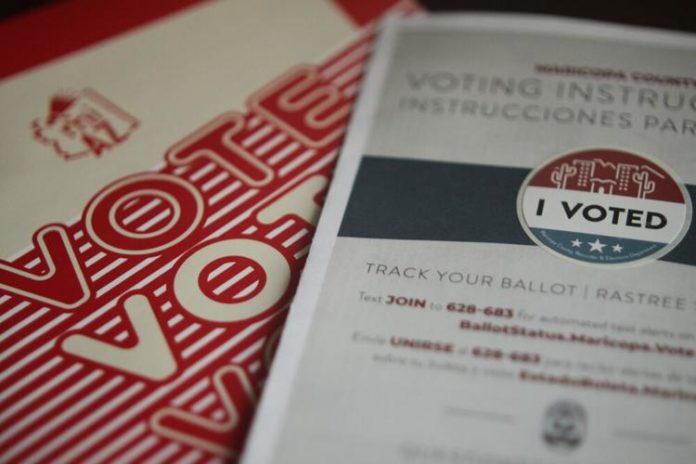
The Arizona Republican Party is asking the state Supreme Court to strike down the vote-by-mail system used by 90% of voters in a battleground state that will be crucial to determining which party controls the U.S. Senate after the 2022 election.
The lawsuit filed Friday argues absentee voting is unconstitutional and asks the justices to get rid of it or at least eliminate the no-excuse absentee balloting system Arizona adopted in 1991 and has steadily expanded ever since.
“In-person voting at the polls on a fixed date (election day) is the only constitutional manner of voting in Arizona,” lawyers for the GOP wrote in their petition to the Arizona Supreme Court.
The lawsuit comes amid GOP efforts on many fronts to remake the system for casting and counting votes as former President Donald Trump repeats the lie that he lost the 2020 election because of fraud in Arizona and other battleground states.
It is modeled on a similar lawsuit in Pennsylvania, where a court in January struck down the state’s two-year-old mail voting law. Democratic Gov. Tom Wolf’s administration has appealed to the state Supreme Court.
The Arizona Republican Party and its combative chairwoman, Kelli Ward, have been at the forefront of Trump’s efforts to cast doubt on the 2020 election results and block the certification of Democratic President Joe Biden’s victory. The latest suit was filed by the state GOP and Yvonne Cahill, the party’s secretary. Ward is not named as a plaintiff.
Several bills introduced in the Legislature aim to eliminate or severely restrict mail balloting, though some look unlikely to succeed due to opposition from one or more Republicans. The Senate voted last week to put a measure on the 2022 ballot that, if approved, would require voters to write their birthday and either a driver’s license number or partial Social Security number on mail ballots starting in 2024.
The suit drew swift condemnation from Democrats who said the GOP is attacking a secure and popular voting method.
“I look forward to once again defending the voters of Arizona and defeating this ridiculous attempt to undermine our elections,” said Democratic Secretary of State Katie Hobbs, a Democrat and a defendant in the case.
The lawsuit is based on lies and conspiracy theories about the 2020 election, said Raquel Terán, a state senator and chairwoman of the Arizona Democratic Party.
“So this is yet another attempt by the Arizona Republicans to make it harder for people to vote,” Terán said.
The lawsuit cites a provision of the state constitution outlining the procedures for citizens to propose their own laws. The constitution says initiatives are decided in “such manner that the electors may express at the polls their approval or disapproval of (a) measure.”
The inclusion of the phrase “at the polls” means the constitution requires ballots to be cast only at in-person polling places, attorneys from the firm Davillier Law Group argued.
They ask the justices to throw out all early voting procedures. If the justices are unwilling to go that far, the GOP asks the court to roll back the expansion of no-excuse absentee voting since 1991, eliminate ballot drop boxes, prohibit ballot-counting before election day, or prohibit voting absentee on initiatives and referenda.
The GOP did not challenge absentee voting for members of the military, which the state is required to allow by federal law.
In 2020, 90% of Arizona voters used a ballot that arrived in the mail, which can be returned through the U.S. Postal Service, an official drop box run by county election officials, or to a polling place. The ballots are collected at a central warehouse, where workers confirm the signature on the outside of the ballot envelope matches signatures on file to verify the vote is legitimate.
There has been no widespread fraud.
Republished with the permission of the Associated Press.













